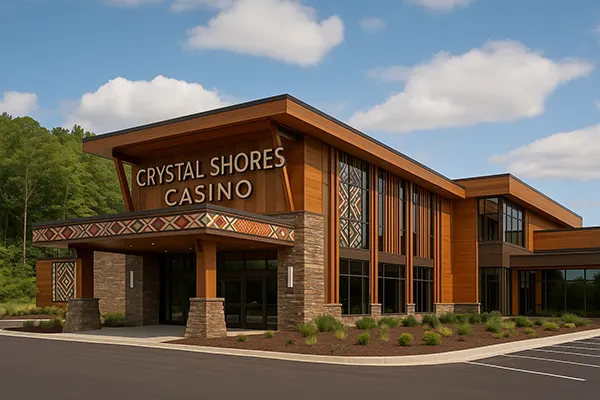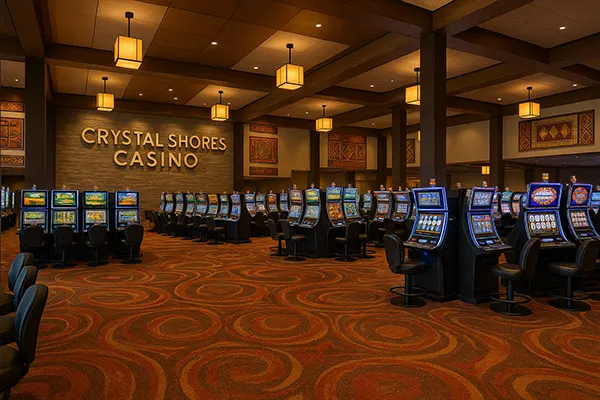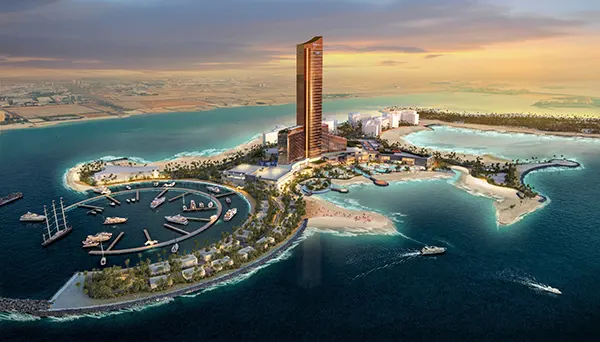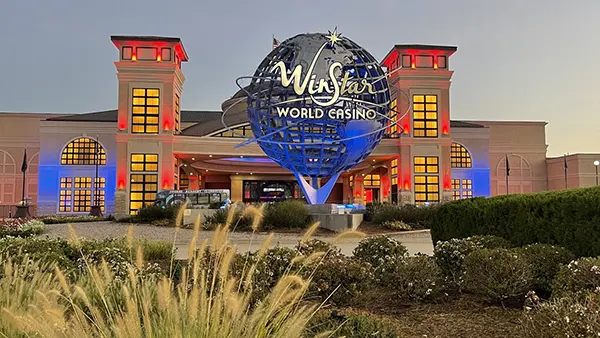Crystal Shores Casino — a New Casino in Michigan by Native American Tribe

In the summer of 2025, Michigan’s gaming sector expanded with the official opening of Crystal Shores Casino. Built and operated by the Pokagon Band of Potawatomi Indians, this land-based casino marks an important milestone in the tribe’s long-term strategy for economic empowerment and regional engagement. Unlike many large-scale entertainment venues, Crystal Shores focuses not only on commercial success but also on community integration, regulatory transparency, and environmental responsibility.
Strategic Location and Economic Impact
Crystal Shores Casino is located in New Buffalo Township, Berrien County, an area popular with tourists from nearby Chicago, Indiana, and across southwest Michigan. The region’s accessibility by road and rail played a key role in site selection, and its natural beauty enhances the casino’s appeal for visitors looking for both gaming and leisure experiences.
The economic effect on the region has been significant. The development phase created hundreds of construction jobs, while the operational stage supports over 400 permanent positions. These include roles in hospitality, security, maintenance, and administration. Additionally, local suppliers and service providers benefit from new commercial partnerships.
The Pokagon Band maintains that all revenues are reinvested into community health, education, and housing initiatives. This makes the casino not only a business venture but also a vital contributor to long-term regional well-being.
Regulatory Framework and Tribal Governance
The casino operates under the authority of the Pokagon Gaming Commission, a regulatory body established in line with the Indian Gaming Regulatory Act (IGRA). This ensures full compliance with federal and tribal laws. All gaming activities are licensed, audited, and monitored for fairness and security.
Crystal Shores is considered a Class III casino, offering table games, slot machines, and sportsbook services under agreements with the state of Michigan. The compact signed with state authorities outlines taxation, oversight, and the reinvestment model.
The Pokagon Band is one of the few federally recognised tribes operating casinos in multiple states, including Indiana and Michigan. Their governance model is frequently cited as an example of effective tribal enterprise management.
Design, Sustainability, and Visitor Amenities
The architecture of Crystal Shores Casino draws upon the cultural heritage of the Pokagon people. Earth tones, wood panelling, and geometric patterns reflect indigenous artistry while creating a welcoming and grounded atmosphere. The facility spans 80,000 square feet, including a spacious gaming floor, dining areas, and lounges.
Environmentally conscious from the start, the construction followed LEED-inspired principles. The casino uses high-efficiency lighting, low-water landscaping, and an advanced HVAC system. Solar panels on the roof supply part of the building’s energy needs, reducing its overall carbon footprint.
Guests can enjoy modern amenities such as a high-end steakhouse, a craft cocktail bar, and a 24-hour café. Ample parking, valet services, and accessibility for people with disabilities are standard. Plans for an adjoining hotel are underway, with completion expected by mid-2026.
Community Involvement and Cultural Initiatives
Crystal Shores is more than a gaming venue — it is a cultural and social hub. The Pokagon Band hosts seasonal events, craft markets, and educational programmes to introduce visitors to Potawatomi traditions. These efforts foster a sense of identity and pride while raising awareness among the broader public.
Portions of casino profits are allocated to community funds supporting local schools, healthcare clinics, and cultural preservation projects. These investments ensure the tribe’s heritage is maintained for future generations while benefiting the surrounding population.
Moreover, the casino has partnered with nearby municipalities for joint safety, transport, and tourism initiatives. This collaboration underlines the Pokagon Band’s commitment to mutual growth and intergovernmental cooperation.

Future Development and Broader Impact
Looking ahead, the Pokagon Band plans to expand Crystal Shores into a full-scale resort by 2026. This includes a luxury hotel, wellness centre, and performance venue. The next development phase is expected to generate an additional 200 jobs and increase annual visitor numbers significantly.
The model established at Crystal Shores is being studied by other tribal nations seeking to build economically sustainable and culturally authentic gaming operations. The balance between tradition, regulation, and commercial viability has positioned the Pokagon Band as a leader in Native American enterprise development.
Crystal Shores Casino is not only a destination for gaming, but a reflection of a people’s resilience, strategic planning, and cultural expression. As Michigan’s gaming market evolves, this venue stands out as a blueprint for meaningful and responsible growth.
Legal and Political Context
Native American gaming in the United States is governed by complex legislation. Under IGRA, tribes are recognised as sovereign entities with rights to operate casinos on trust land, provided they follow federal and state compacts. The Pokagon Band’s ability to open Crystal Shores reflects successful navigation of this legal framework.
The casino has received bipartisan support in Michigan due to its transparent management, regional benefits, and legal compliance. Community hearings and environmental reviews were conducted ahead of final approvals, reinforcing public accountability.
As debates over gaming regulation continue nationwide, Crystal Shores exemplifies how a Native American-owned venue can thrive within the legal system while offering tangible benefits to the local and tribal communities alike.



